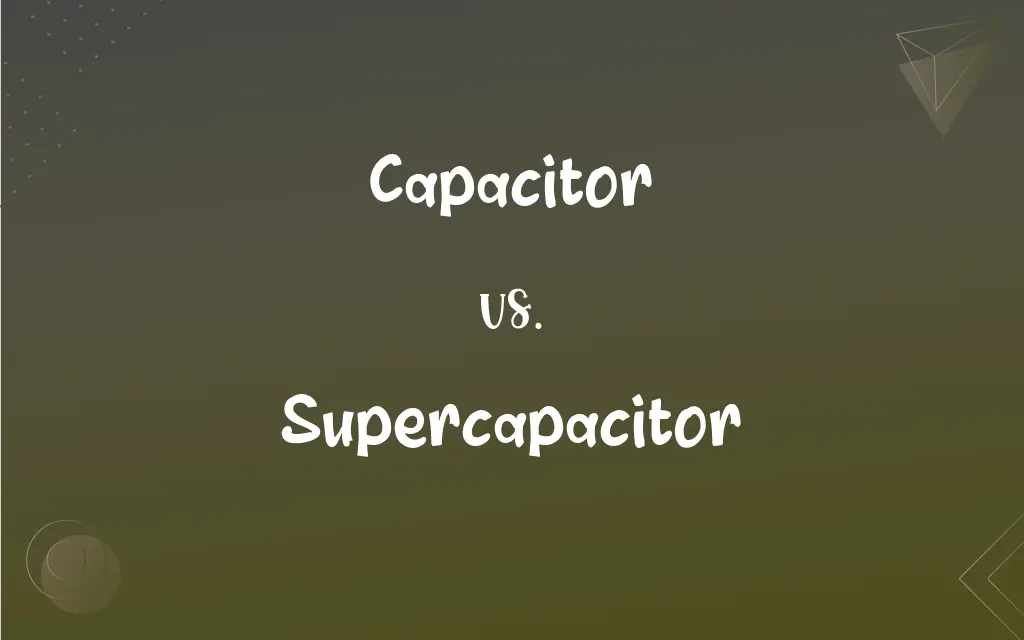Capacitor vs. Supercapacitor: What's the Difference?
Edited by Aimie Carlson || By Janet White || Published on April 7, 2024
Capacitor is an electronic component storing energy via an electric field between two plates. Supercapacitor is a high-capacity capacitor with higher energy density and longer life cycle.

Key Differences
A capacitor is an essential component in electronic circuits, typically used for storing electric charge temporarily. It functions by accumulating an electric field between two conductive plates separated by an insulating material or dielectric. Conversely, a supercapacitor, also known as an ultracapacitor, is a high-capacity capacitor with significantly greater energy storage capacity. Unlike standard capacitors, supercapacitors store energy through a different mechanism, often involving electrochemical processes, allowing for higher charge and discharge rates.
Capacitors are generally known for their ability to release energy quickly, which is essential in applications like power conditioning, signal processing, and motor starters. They are typically used for short-term energy storage due to their limited storage capacity. Supercapacitors, on the other hand, excel in applications requiring rapid charge and discharge cycles over extended periods. Their design allows for a much higher energy density, making them suitable for applications like regenerative braking in vehicles and as backup power sources.
The energy storage capacity of capacitors is relatively low compared to supercapacitors. Capacitors are often used in electronic devices for functions like smoothing power supply fluctuations and managing power use. In contrast, supercapacitors, with their higher energy densities, are capable of providing significant power boosts in applications like electric vehicles, where they can supplement or replace batteries.
Lifespan is another key difference. Traditional capacitors typically have a longer life cycle than batteries but are surpassed by supercapacitors, which can withstand hundreds of thousands of charge and discharge cycles with minimal degradation. This durability makes supercapacitors a valuable component in systems where long-term reliability and frequent cycling are required.
In terms of cost and size, capacitors are generally more economical and smaller, fitting easily into a wide range of electronic devices. Supercapacitors, while more expensive, offer a trade-off in terms of their superior energy storage and longevity, justifying their use in more specialized and high-demand applications.
ADVERTISEMENT
Comparison Chart
Energy Storage Mechanism
Electric field
Electrochemical processes
Energy Density
Lower
Higher
Application
Short-term energy storage, power smoothing
Rapid charge/discharge, long-term energy supply
Lifespan
Moderate
Longer
Cost and Size
More economical, smaller
More expensive, larger
ADVERTISEMENT
Capacitor and Supercapacitor Definitions
Capacitor
Energy Storage Component.
The capacitor in the circuit stored the excess energy.
Supercapacitor
High-Capacity Energy Storage.
The supercapacitor stored enough power to start the engine.
Capacitor
Transient Protection.
The capacitor protects the circuit from voltage spikes.
Supercapacitor
Rapid Charge/Discharge Device.
Supercapacitors quickly release energy for the car's acceleration.
Capacitor
Electric Field Accumulator.
A capacitor uses an electric field to accumulate charge.
Supercapacitor
Regenerative Braking Integrator.
In electric vehicles, supercapacitors aid in regenerative braking.
Capacitor
Power Smoothing Device.
Capacitors help smooth out power fluctuations in electronic devices.
Supercapacitor
High Energy Density Capacitor.
Supercapacitors are preferred for their high energy density in portable devices.
Capacitor
Signal Processing Tool.
In the radio, a capacitor is used for tuning frequencies.
Supercapacitor
Long-Life Energy Component.
This supercapacitor can last for thousands of charge cycles.
Capacitor
An electric circuit element typically consisting of two metallic plates separated and insulated from each other by a dielectric, used to store charge temporarily or to filter signal frequencies. Also called condenser.
Supercapacitor
Any of several types of capacitor that have an unusually high capacitance
Capacitor
(electronics) An electronic component capable of storing electrical energy in an electric field; especially one consisting of two conductors separated by a dielectric.
Capacitor
A device used in electronic circuits to hold electrical charge, consisting of two conducting plates separated by a nonconducting (dielectric) medium; it is characterized by its capacitance.
Capacitor
An electrical device characterized by its capacity to store an electric charge
FAQs
How does a supercapacitor differ in energy storage?
It stores more energy and for longer durations.
What's the primary function of a capacitor?
To store and release electrical energy temporarily.
What's the lifespan comparison between the two?
Supercapacitors generally have a longer lifespan.
Can capacitors be used in power supply circuits?
Yes, they're often used to smooth power supply fluctuations.
How fast can a supercapacitor charge?
They can charge extremely quickly, in seconds to minutes.
Can supercapacitors be used in renewable energy systems?
Yes, especially for storing and releasing energy quickly.
Are supercapacitors suitable for electric vehicles?
Absolutely, especially for energy-intensive tasks like regenerative braking.
How does temperature affect capacitors and supercapacitors?
Both can be affected by temperature, but supercapacitors often have a wider operating range.
Can a capacitor replace a battery?
Not typically, due to its lower energy capacity.
What applications are supercapacitors not good for?
Long-term energy storage, where batteries are more efficient.
Are capacitors used in everyday electronics?
Yes, they are common in devices like TVs, computers, and radios.
How environmentally friendly are capacitors?
Most are, but it depends on the materials used.
Do capacitors have a memory effect?
No, capacitors do not suffer from memory effect.
Can capacitors help in energy efficiency?
Yes, they improve energy efficiency in various electronic devices.
Do supercapacitors degrade over time?
They do, but at a much slower rate than batteries.
Is a capacitor expensive?
They are generally more affordable compared to supercapacitors.
Are supercapacitors safe to use?
Generally yes, but they must be properly managed to avoid overcharging.
What are the maintenance requirements for capacitors?
They require minimal maintenance, but regular checks are advisable.
What are the size differences between the two?
Supercapacitors are typically larger due to their higher capacity.
Can supercapacitors be recycled?
Yes, they are generally more recyclable than batteries.
About Author
Written by
Janet WhiteJanet White has been an esteemed writer and blogger for Difference Wiki. Holding a Master's degree in Science and Medical Journalism from the prestigious Boston University, she has consistently demonstrated her expertise and passion for her field. When she's not immersed in her work, Janet relishes her time exercising, delving into a good book, and cherishing moments with friends and family.
Edited by
Aimie CarlsonAimie Carlson, holding a master's degree in English literature, is a fervent English language enthusiast. She lends her writing talents to Difference Wiki, a prominent website that specializes in comparisons, offering readers insightful analyses that both captivate and inform.































































